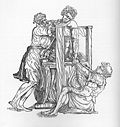Hippocrates: Difference between revisions
No edit summary |
CSV import |
||
| (One intermediate revision by the same user not shown) | |||
| Line 11: | Line 11: | ||
| occupation = [[Physician]] | | occupation = [[Physician]] | ||
| era = [[Classical Greece]] | | era = [[Classical Greece]] | ||
| title = The Father of Western Medicine}} | | title = The Father of Western Medicine | ||
}} | |||
'''Hippocrates''' (c. 460 – c. 370 [[BC]]) was a [[Ancient Greece|Greek]] [[Medical doctor|doctor]] who is called the "father of [[medicine]]". He was the first person to teach that people got sick for [[science|scientific]] reasons. Previously, people believed that [[disease]] was caused by angry gods. | '''Hippocrates''' (c. 460 – c. 370 [[BC]]) was a [[Ancient Greece|Greek]] [[Medical doctor|doctor]] who is called the "father of [[medicine]]". He was the first person to teach that people got sick for [[science|scientific]] reasons. Previously, people believed that [[disease]] was caused by angry gods. | ||
| Line 45: | Line 46: | ||
[[Category:Greek physicians]] | [[Category:Greek physicians]] | ||
[[Category:Ancient Greek philosophers]] | [[Category:Ancient Greek philosophers]] | ||
<gallery> | |||
File:Hippocrates.jpg|Hippocrates | |||
File:Hippocrate refusant les présents d'Artaxerxès (original).JPG|Hippocrates | |||
File:Kos Asklepeion.jpg|Hippocrates | |||
File:HippocraticBench.png|Hippocrates | |||
File:Ancientgreek surgical.jpg|Hippocrates | |||
File:ClubbingFingers1.jpg|Hippocrates | |||
File:GreekReduction.jpg|Hippocrates | |||
File:HippocraticOath.jpg|Hippocrates | |||
File:Galenoghippokrates.jpg|Hippocrates | |||
File:Engraving; bust of Hippocrates; by Paul Wellcome L0019959.jpg|Hippocrates | |||
File:Hippocrates sculpture in front of Mayne Medical School, Brisbane, 2021.jpg|Hippocrates | |||
File:Kos museum mos01.JPG|Hippocrates | |||
</gallery> | |||
Latest revision as of 01:22, 20 February 2025
Hippocrates (c. 460 – c. 370 BC) was a Greek doctor who is called the "father of medicine". He was the first person to teach that people got sick for scientific reasons. Previously, people believed that disease was caused by angry gods.
Many of Hippocrates' writings are still important to doctors. For example, patient confidentiality, meaning that doctors can only discuss a patient with the patient themselves. Another of his ideas is to never knowingly lead a patient to suffering or death. These kinds of ideas are part of medical ethics.
The Hippocratic Oath is named after him. This is a set of rules which doctors promise to obey. This is an example of a modern Hippocratic Oath used at the University of North Carolina School of Medicine. I do solemnly swear by all I hold most sacred:
- that I will be loyal to the profession of medicine and just to its members
- that I will lead my life and practice my art with virtue and honor
- that into whatsoever home I shall enter it shall be for the good of the sick and the well by the utmost of my power and that I will hold myself aloof from wrong and from corruption and from the tempting of others to vice
- that I will exercise my art solely for the benefit of my patients, the relief of suffering, the prevention of disease and promotion of health, and I will give no drug and perform no act for an immoral purpose
- that in the treatment of the sick, I will consider their well-being to be of a greater importance than their ability to compensate my services
- that what I may see or hear in the course of treatment or even outside the treatment in regard to the lives of persons which is not fitting to be spoken, I will keep inviolably secret
- that I will commit myself to a lifetime of continued learning of the art and science of medicine
- these things I do promise and in proportion as I am faithful to this oath, may happiness and good repute be ever mine, but should I trespass and violate this oath, may the reverse be my lot.
- 460s BC births
- 370s BC deaths
- 5th-century BC Greek physicians
- 4th-century BC Greek physicians
- Ancient Greek science writers
- Ancient Greeks in Thessaly
- Ancient Koans
- Classical humanists
- Ionic Greek writers
- Longevity myths
- Year of birth uncertain
- Year of death uncertain
- 460 BC births
- 377 BC deaths
- Greek physicians
- Ancient Greek philosophers














